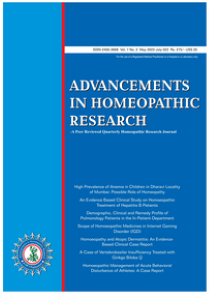Chronic Kidney Disease: A Case Series
DOI:
https://doi.org/10.48165/ahr.2023.8.2.3%20Keywords:
Haemodialysis (HD), peritoneal dialysis (PD), chronic kidney disease (CKD), chronic renal failure (CRF), end stage renal disease (ESRD), serum urea, blood urea nitrogen (BUN), serum creatinine, estimated glomerular filtration rate (eGFR), renal transplant, homoeopathic treatmentAbstract
Chronic renal failure (CRF) is a progressive and irreversible deterioration of renal functions. Diabetes, hypertension, indiscriminate use of antibiotics and non-steroidal anti-inflammatory drugs (NSAIDs) are major contributory factors of chronic kidney disease (CKD) or end stage renal disease (ESRD). (1,2) In modern system, the role of medicinal treatment is very limited while haemo or peritoneal dialysis is cumbersome and expensive. Economic and legal issues limit the possibility of renal transplant and depends on the availability of donor.(3) On the other hand, homoeopathic treatment, if sought at an early stage, can help in maintaining or to some extent reviving renal functions by lowering serum creatinine thereby improving GFR. Gupta et. al. has done some work on the medicinal treatment of this difficult disease and have published the results.(4)
References
Jha V. Current status of end-stage renal disease care in India and Pakistan. Kidney International
Supplements 2013; (3): 157-160; doi: 10.1038/ kisup.2013.3. (http://www.nature.com/kisup/journal/ v3/n2/full/kisup20133a.html).
Indian Council of Medical Research, New Delhi. Study on causes of death by verbal autopsy of India 2011; (http://icmr.nic.in/final/causes_death/causes_ death.htm) (accessed 11 December 2011).
Chugh KS, Jha V, Chugh S. Economics of dialysis and renal transplantation in the developing world. Transplant Proc 1999; (31): 3275-3277.
Gupta G, Gupta N, Pandey D, Gupta G. A clinical study on the role of homoeopathic medicines in chronic renal failure patients assessed by estimated glomerular filtration rate (eGFR). National Journal of HomoeopathyJun 2015 (189thissue); 17(6): 14-29.
Skorecki K, Green J, Brenner BM. Chronic renal failure. Harrisons Principles of Internal Medicine 2005 16th edition: 1653-1662.
Singh S, Varanasi R, Garg K, Sehrawat N, Bhatti J, Chakma A. Homoeopathy in the management of chronic kidney disease – A narrative review. Indian J Res Homoeopathy 2022;16(3):216-223.
Cavalcanti AM, Racha LM, Carilla R, Lima LU, Lugon JR. Effects of homeopathic treatment on pruritus of haemodialysis patients:A randomised placebo-controlled double-blind trial. Homeopathy2003;92:177-181.
Boericke W. Boericke’s New Manual of Homoeopathic Materia Medica with Repertory. 3rd edition; New Delhi: B Jain Publishers (P) Ltd.; 2007. 60-61, 217, 736-737, 998, 1089.
Van Haselen RA. Homeopathic clinical case reports: Development of a supplement (HOM-CASE) to the CARE clinical case reporting guideline. Complement Ther Med 2016;25:78-85.
Teut M, Van Haselen RA, Rutten L, Lamba CD, Bleul G, Ulbrich-Zürni S. Case Reporting in Homeopathy an Overview of Guidelines and Scientific Tools. 2022;111:2-9.
Dal-Ré R, Janiaud P, Ioannidis JP. Real-world evidence: How pragmatic are randomized controlled trials labeled as pragmatic? BMC Med 2018;16:1-6.
Ruggenenti P, Cravedi P, Remuzzi G. Mechanisms and treatment of CKD. J Am SocNephrol 2012;23:1917- 1928.
Hanna RM, Ghobry L, Wassef O, Rhee CM, Kalantar-Zsdeh K. A practical approach to nutrition, protein-energy wasting, sarcopenia, and cachexia in patients with chronic kidney disease. Blood Purif 2020;49:202-211.
Braam B, Taler SJ, Rahman M, Fillaus JA, Greco BA, Forman JP, et al. Recognition and management of resistant hypertension. Clin J Am SocNephrol 2017;12:524-535.




